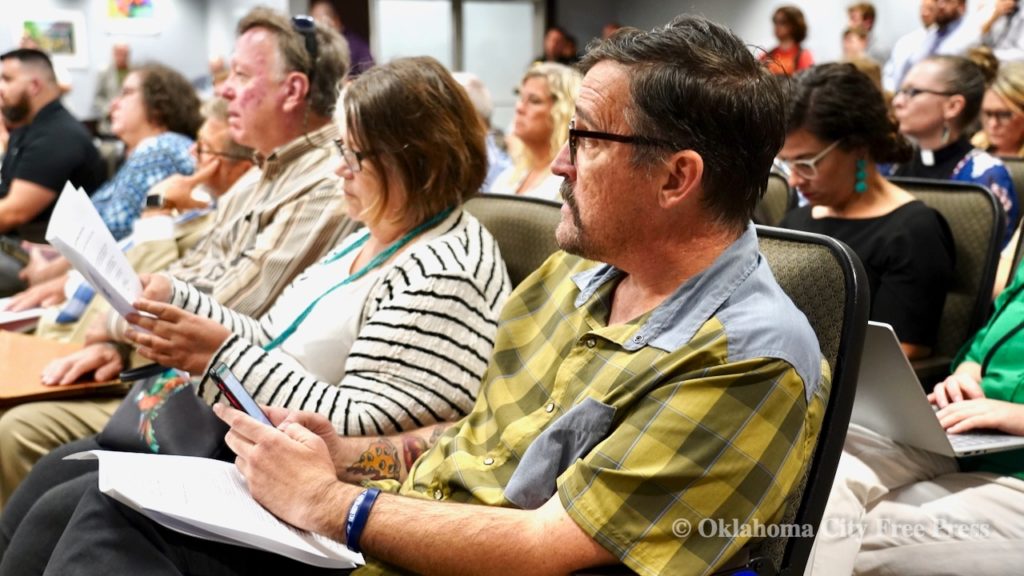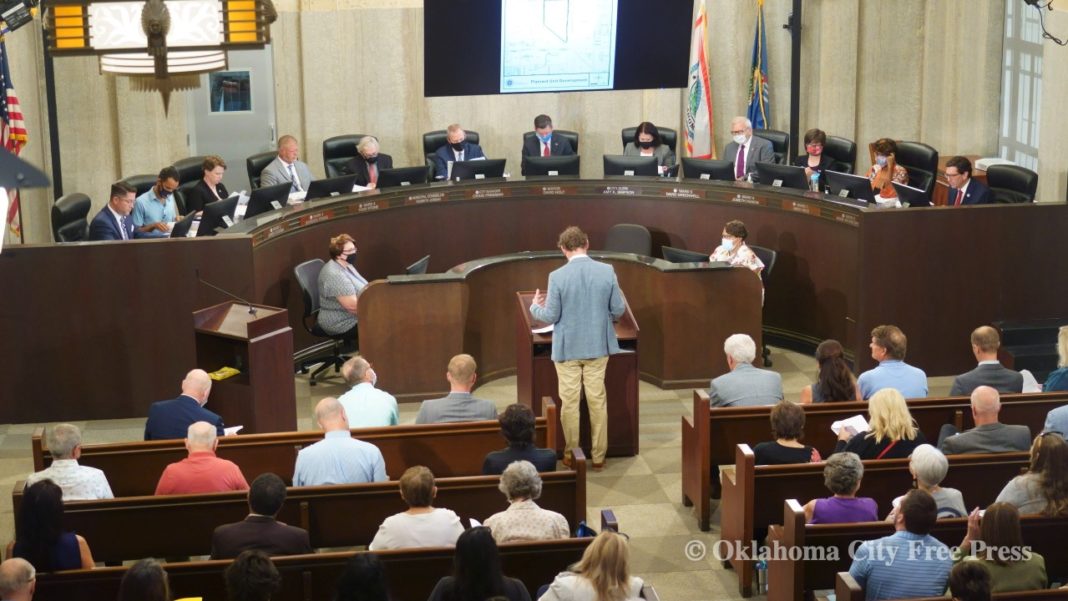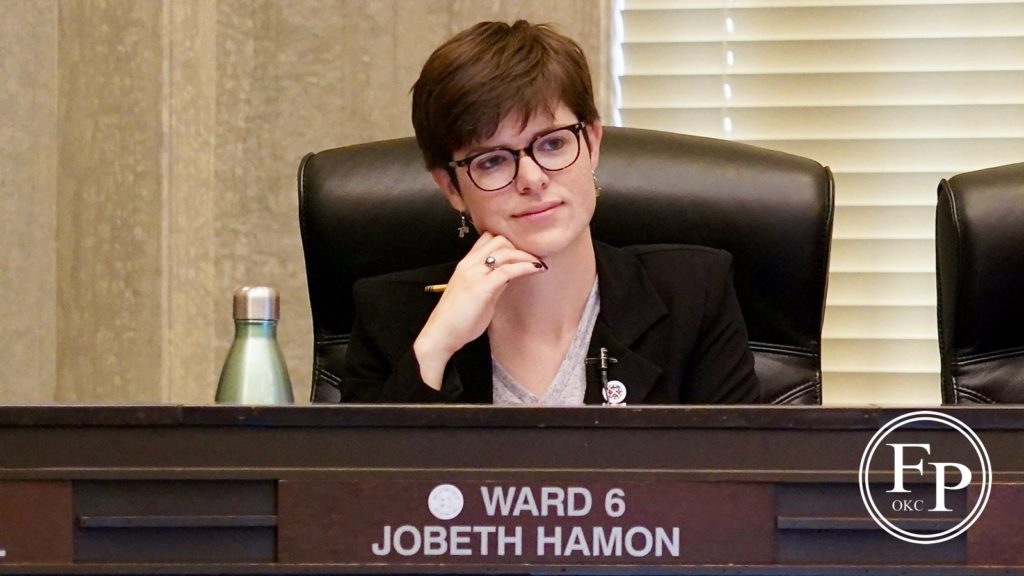Last Updated on October 26, 2021, 3:06 PM | Published: October 26, 2021
OKLAHOMA CITY (Free Press) — On Tuesday the City Council of Oklahoma City met to discuss urban chickens, among other important pieces of business.
The Council introduced and sent to the Planning Department a new ordinance that would allow having chickens or quail in city limits, with certain restrictions.
The Council went on to hear a presentation from EMSA about a restructuring of how some calls are addressed.
Also, the Council voted 6-3 to create a new crime relating to code enforcement that residents of Oklahoma City will now be subject to.

Marty Peercy reports Local government
Urban Chickens
A new ordinance authored by three Council members is headed to the Planning Department for vetting.
Bradley Carter (Ward 1), JoBeth Hamon (Ward 2), and Nikki Nice (Ward 7) co-authored the ordinance that, if adopted, will make it legal for Oklahoma City residents to own chickens or quail for primarily personal use.
In developing the ordinance, the municipal counselor’s office looked at other municipalities in Oklahoma to understand their policies regarding chicken ownership. After comparing the various strategies employed by other towns, a set of recommendations were set forth for how Oklahoma City might change existing law to allow residents to own fowl.
The ordinance, which was introduced by a vote of 8-1 (Ward 5 Councilman David Greenwell voting in opposition), creates easy-to-follow parameters for where and how chickens may be kept.
The ordinance prohibits rooster ownership but allows the ownership of six domestic hens or quail.
Coops must be behind the dwelling and must have ten feet of separation between the coop and the rear of the property, and no closer than five feet on the side property line, and at least 30 feet from any adjacent dwelling.
The birds must be kept inside the coop from dusk until dawn, and they cannot be kept inside the owner’s dwelling.
A new ordinance will not override existing covenants that prohibit ownership of fowl.
The ordinance will now go to the Planning Department for fine-tuning, then to the Planning Commission to make a recommendation to the Council for adoption or rejection of the ordinance.
Ambulance Code
An amendment to the City’s Ambulance Code was introduced at Tuesday’s meeting.
EMSA, in concert with the municipal counselor’s office and the Oklahoma City Fire Department, gave a presentation on a restructuring of how ambulances are deployed for different emergency calls.
Under the current structure, Each ambulance has a paramedic able to deliver advanced life support (ALS).
The proposed amendment to the code will allow EMSA to deploy more ambulances with only EMTs on board. EMTs are able to offer basic life support (BLS) to patients experiencing lower acuity emergencies.
EMSA’s calls for services are 7.7% higher than last year, but nationwide we are seeing a shortage of paramedics, which spreads thin service providers like EMSA.
EMSA offers a program wherein EMTs are able to be paid to go to paramedic school.
BLS calls generate less revenue than ALS calls, which will likely lead to a loss of over $200,000 over the year, if the amendment is adopted. However, services will not be reduced.
The amendment will allow more ambulances to be deployed during shifts because each ambulance will not necessarily need to have a paramedic on board.
Furthermore, ALS responders who arrive and discover a lower acuity of emergency will still offer services rather than calling in a BLS truck.
The amendment was introduced on Tuesday, will be up for public hearing in two weeks, and voted on by the Council two weeks after that.
New Crime
The Council voted by majority to create a new crime in Oklahoma City’s Municipal Code.
The new ordinance makes it illegal to obstruct a code enforcement officer in the performance of their duties.
Ward 6 Councilor JoBeth Hamon* explained that she has a philosophy of “no new fines, no new crimes.”
As an alternative, Hamon recommended using budget money to make it easier to help people be in compliance, rather than criminalizing city residents who might have negative reactions to code enforcement officers when residents are not able to keep their homes in a state permissible by City code.
Hamon emphasized that her lack of support for the new penalty in no way diminished her respect for code enforcement employees, who have a huge workload and a sometimes very difficult job. But, Hamon said, punitive measures do not prevent nor repair the harm done between persons.
A member of the municipal counselor’s office explained the ordinance again after Hamon’s comments. Hamon restated her opinion, to which the attorney responded by yet again explaining the ordinance.
“I don’t need it explained. I already understand the point,” Hamon said before reiterating her point. Ward 2’s James Cooper and Ward 7’s Nikki Nice echoed Hamon’s concerns.
Ward 4 Councilman Todd Stone said that code enforcement is a difficult job and he believes the city has a duty to protect those employees in the discharge of their duties. Hamon again pointed out that punitive measures do not deter crime, nor do they repair harm.
The ordinance passed 6-3. Cooper, Hamon, and Nice voted no.
The Council will meet again on November 9 at 8:30 a.m.
*Hamon is the spouse of this reporter.
Columnist covering local government in Oklahoma City and Oklahoma County from May 2019 through June 2023.












